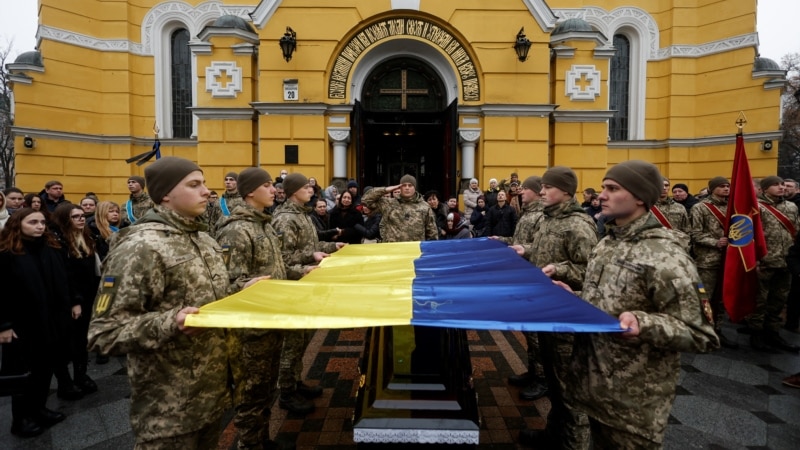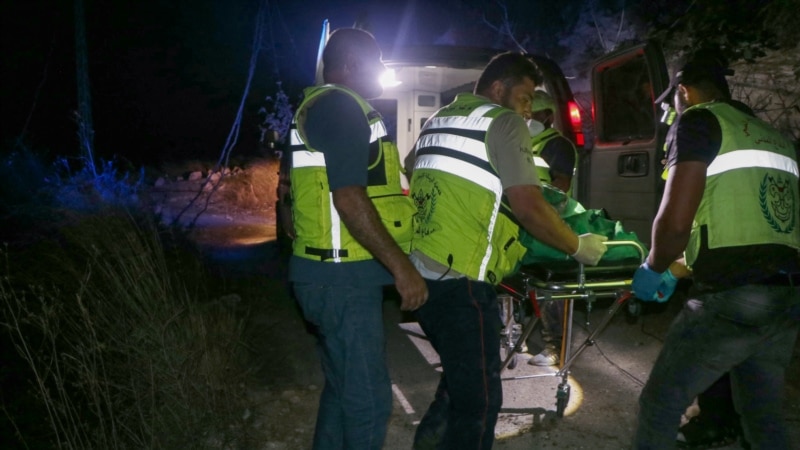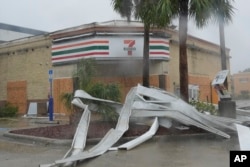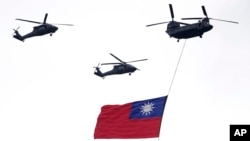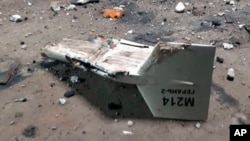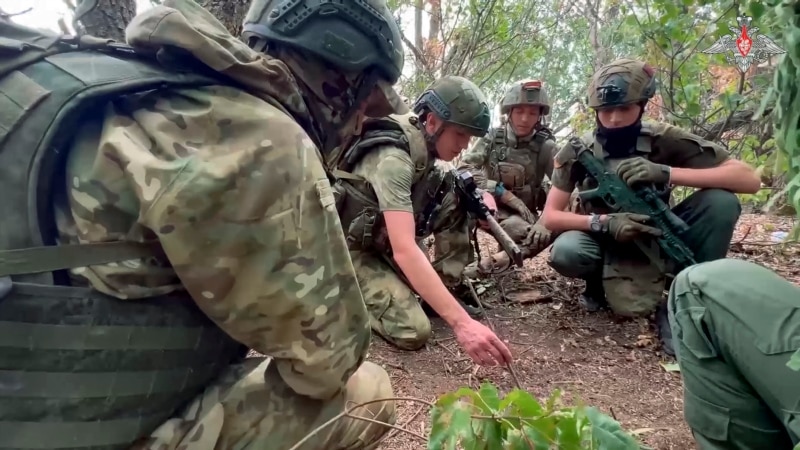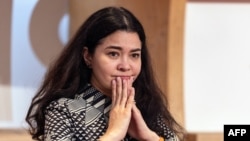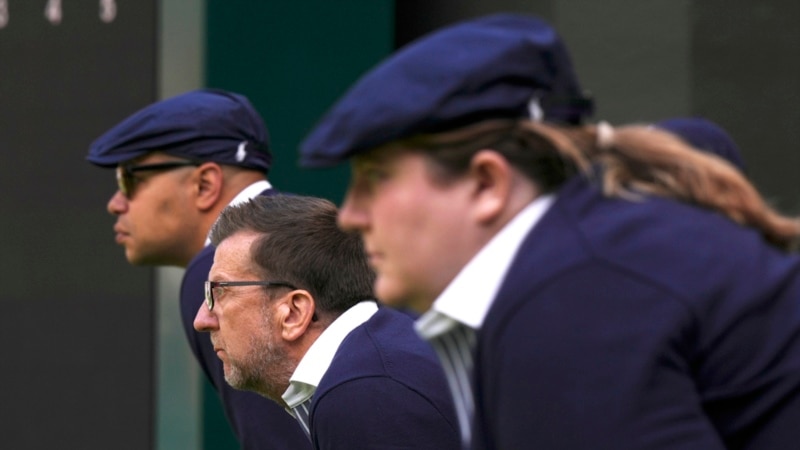For full coverage of the crisis in Ukraine, visit Flashpoint Ukraine.
The latest developments in Russia’s war on Ukraine. All times EST.
French Minister for the Armed Forces Sebastien Lecornu laid a wreath at a heroes’ monument in Ukraine’s capital on Wednesday. He was scheduled to meet with President Volodymyr Zelenskyy, Ukrainian Defense Minister Oleksiy Reznikov and army officials.
While France has been less vocal about its military support for Ukraine than the United States and Britain, the country has sent a steady supply of weapons since Russia invaded its neighbor on Feb. 24. Lecornu tweeted that the French government’s backing is “constant” while efforts are made to reach an eventual negotiated end to the war.
8:40 a.m.: For the paratroopers of a Ukrainian airborne brigade, there’s only one way to describe the waves of Russian infantry who are relentlessly pressing the Ukrainian lines in and around this Donbas city: Meat.
“First, they throw in the mobilized soldiers for certain death, like meat,” one soldier, who asked not to be identified due to military regulations, told Radio Free Europe/Radio Liberty. “Then, if they break through, the more experienced fighters move in.”
With Russian’s invasion of Ukraine now in its 11th month, the ferocity of the fighting in Kreminna is matched only by the intensity of the fighting 80 kilometers to the south, in the city of Bakhmut.
But according to interviews with Ukrainian soldiers and accounts published on Russian military blogger accounts on Telegram and elsewhere, the bloodshed is no less senseless and relentless. It’s unclear how long it will last, though: One Ukrainian official claims that Kreminna is on the verge of being recaptured by Ukrainian forces.
8:16 a.m.:
7:30 a.m.: Russia’s economy contracted by more than 2% over the past 11 months, Prime Minister Mikhail Mishustin said during a televised government meeting on Wednesday.
7:15 a.m.: Air raid sirens sounded across all Ukraine’s regions on Wednesday but there were no immediate reports of any new Russian missile strikes.
The capital Kyiv and other regions sounded the all-clear almost two hours later.
Ukrainian social media reports said the nationwide alert may have been declared after Russian jets stationed in Belarus took off.
Reuters was unable to immediately verify that information.
6:50 a.m.: A tip-off from a friendly Western intelligence agency helped Germany identify an employee in its foreign intelligence service (BND) who was arrested on suspicion of passing state secrets to Russia, Reuters reported Wednesday citing the Spiegel magazine.
Police in December arrested a German citizen identified as Carsten L. in a treason investigation, and searched his home and workplace and those of another person. The Russian embassy has declined comment.
The German authorities have warned of likely heightened Russian spying given the Kremlin’s standoff with the West over its invasion of Ukraine. The German government expelled what it said were 40 Russian spies in April.
Citing people familiar with the investigation, Spiegel reported that a Western intelligence agency had found material in Moscow’s possession that came from the BND and contained intelligence on Russia.
The suspected double agent was the head of a unit in the BND’s technical reconnaissance department, Spiegel said.
The BND and the attorney general’s office declined comment.
A government spokesperson also declined comment at a press briefing, saying the government took the matter seriously but it would not divulge details about the investigation in a way that could benefit Russia.
6 a.m.: The head of Russia’s state-controlled airline Aeroflot called on the Russian government to “balance the interests” of Russian and foreign airlines in order to support the domestic aviation sector, Reuters reported in an interview with Russian news site RBC published on Wednesday.
In the interview, Aeroflot CEO Sergei Alexandrovsky said it is “important that the state balances the interests of Russian and international carriers. Because it is obvious that foreign carriers now have much more opportunities and advantages in these conditions.”
Russian airlines stopped flying to most overseas destinations after Western countries imposed unprecedented sanctions, including bans on Russian carriers, after Moscow sent tens of thousands of troops into Ukraine on February 24. Routes to Turkey and Middle Eastern countries popular with Russian tourists have been preserved.
Alexandrovsky said that competitors, including Turkish Airlines and Emirates had benefitted most from the situation, and called for a degree of what he called “state protectionism” to safeguard domestic aviation.
5:47 a.m.: Russia did not consult with OPEC+ on its response to a Western price cap on Russian oil, Reuters reported that Kremlin spokesman Dmitry Peskov said on Wednesday, stating that it was Russia’s sovereign right to respond as it sees fit to such “illegal measures”.
President Vladimir Putin on Tuesday delivered Russia’s long-awaited response to the cap, signing a decree that bans the supply of crude oil and oil products from Feb. 1 for five months to nations that abide by it.
Peskov said contacts between Russia and the OPEC+ group of leading global oil producers, which includes Russia, were ongoing on other issues.
5:30 a.m.: According to Reuters, the Kremlin on Wednesday said that peace proposals to end the conflict in Ukraine must take into account what it called “the new reality” of four Ukrainian regions having joined Russia.
Russia declared Ukraine’s Donetsk, Luhansk, Kherson and Zaporizhzhia part of its territory in September after referendums condemned by Ukraine and Western countries. Russia does not fully control any of the four regions.
5:10 a.m.: In an interview with The Associated Press, Ukraine’s Minister of Digital Transformation, Mykhailo Fedorov, called Russia’s invasion of Ukraine the first major war of the digital age. Now, technology like drones and satellite internet systems are mentioned in the same breath as traditional tanks, missiles and other weapons.
Ukraine has bought more than 1,400 drones and, in the interview, Fedorov discussed where he sees the technology going and how Ukraine plans to outpace Russia in the months ahead.
4:40 a.m.:
4:15 a.m.: One of President Vladimir Putin’s most powerful Kremlin aides has visited the Russian-controlled Zaporizhzhia nuclear power plant in a part of southern Ukraine Russia says it has annexed, Reuters cited a Moscow-installed official in the region as saying.
Sergei Kiriyenko, a Kremlin official responsible for overseeing Russia’s domestic politics and a former head of the country’s state nuclear corporation, discussed the safety of the plant, according to Vladimir Rogov, a Russian-installed local official.
“Sergei Kiriyenko visited the nuclear power plant — he checked the safety of the facility and the working conditions of Rosatom employees,” Rogov said on Telegram.
In a picture published by Rogov, Kiriyenko was shown outside the plant, which lies just 500 km (300 miles) from the site of the world’s worst nuclear accident, the 1986 Chornobyl disaster.
Shortly after invading Ukraine on February 24, Russian forces took control of the plant in early March. The facility remains near the frontlines, and has repeatedly come under fire in recent months, with Kyiv and Moscow trading blame for the shelling.
Special Russian military units guard the facility and Russian nuclear specialists are on site. Ukrainian staff continue to help operate the plant.
The Zaporizhzhia nuclear power plant has six Soviet-designed VVER-1000 V-320 water-cooled and water-moderated reactors containing Uranium 235, which has a half-life of more than 700 million years.
IAEA Director General Rafael Grossi has proposed the establishment of a nuclear safety and security protection zone around the plant.
3:50 a.m.:
3:30 a.m.: Reuters reported that Italy’s defense minister struck a cautious tone on whether Italy would be able to supply Ukraine with air defense systems, as requested by President Volodymyr Zelenskyy.
The systems would be provided “if possible,” Guido Crosetto told Il Messaggero newspaper in an article published on Wednesday.
However, “if we give air defense missiles to Ukraine, we must take them from our stocks and we have to do that without depleting them, and being sure about the quality,” he added.
Crosetto told Reuters this month that the Franco-Italian SAMP/T air defense system was among the military aid that Kyiv had requested from Rome.
His remarks to Il Messaggero follow a Tuesday call between Zelenskyy and Italian Prime Minister Giorgia Meloni, after which Zelenskyy tweeted that Rome was considering supplying air defenses.
He is pressing Ukraine’s Western allies to step up military aid to help counter three months of Russian missile and drone strikes on civilian infrastructure.
Under former Prime Minister Mario Draghi, Italy sent five aid packages to Kyiv including military supplies, and Meloni’s government is working on a possible sixth delivery.
Meloni, who took office in October, has been a firm supporter of Kyiv, despite friction on the issue within her rightist ruling coalition and a strong pacifist element among domestic public opinion.
2:50 a.m.: Reuters reported that Russia’s Gazprom said that it will ship 42.3 million cubic meters of gas to Europe via Ukraine on Wednesday, a volume broadly in line with recent days.
2:20 a.m.:
2 a.m.:
1:30 a.m.: Russian forces fired 33 rockets at civilian targets in the Ukrainian city of Kherson in the 24 hours to early Wednesday,Reuters reported citing Ukraine’s military, as fighting intensified with Russia deploying more tanks and armored vehicles on front lines.
The General Staff of Ukraine’s Armed Forces said in its morning report that Russia forces were attacking populated areas on the right bank of the Dnipro River near Kherson with mortars and artillery.
Russia denies targeting civilians. Reuters was unable to immediately verify the reports.
1:03 a.m.: Russian troops who have been part of a mobilization drive for military operations in Ukraine will have the right to get their sperm frozen for free in cryobanks, Reuters reported Wednesday, citing the state TASS agency.
Quoting Igor Trunov, president of the Russian Union of Lawyers, TASS reported that the Health Ministry responded to his appeal for budgetary assistance with the plan.
The ministry “determined the possibility of financial support from the federal budget for free conservation and storage of germ cells (spermatozoa) for citizens mobilized to participate in the special military operation for 2022-2024,” Trunov was quoted as saying.
Families can also use the stored biomaterial free of charge if their compulsory medical insurance indicates they can do so.
Russia called up more than 300,000 reservists to support what it calls its “special military operation” in Ukraine in a mobilization drive launched in September.
The drive prompted hundreds of thousands of Russian men to flee from the country to avoid being conscripted and sparked the largest anti-Kremlin protests since Russia sent in its troops into Ukraine in February.
The war, which Ukraine and its Western allies call an unprovoked aggression to grab land is in its 11th month, having entered a slow, grinding phase as bitter winter weather has set in.
12:35 a.m.: Reuters has published an explainer on Ukrainian President Volodymyr Zelenskyy’s 10-point peace plan, which he first introduced at the G-20 Summit Meeting in November. The plan calls for:
1. Radiation and nuclear safety, focusing on restoring safety around Europe’s largest nuclear power plant, Zaporizhzhia in Ukraine, which is now-Russian occupied.
2. Food security, including protecting and ensuring Ukraine’s grain exports to the world’s poorest nations.
3. Energy security, with focus on price restrictions on Russian energy resources, as well as aiding Ukraine with restoring its power infrastructure, half of which has been damaged by Russian attacks.
4. Release of all prisoners and deportees, including war prisoners and children deported to Russia.
5. Restoring Ukraine’s territorial integrity and Russia reaffirming it according to the U.N. Charter, which Zelenskyy said is “not up to negotiations.”
6. Withdrawal of Russian troops and cessation of hostilities, restoration of Ukraine’s state borders with Russia.
7. Justice, including the establishment of a special tribunal to prosecute Russian war crimes.
8. Prevention of ecocide, protection of environment, with focus on demining and restoring water treatment facilities.
9. Prevention of escalation of conflict and building security architecture in the Euro-Atlantic space, including guarantees for Ukraine.
10. Confirmation of the war’s end, including a document signed by the parties involved.
12:03 a.m.: Ukraine’s population may shrink to 35 million by 2030, demographers in Ukraine’s Mykhailo Ptukha Institute have predicted, down from the pre-war number of 41 million, Euromaidan Press reported.
The institute director Ella Libanova said during a presentation that this is the optimistic estimate: Russia’s full-blown war is leading to excessive mortality not only by killing people with weapons but through elevated stress, overburdening, insufficient medical care, lack of proper nutrition.
The pessimistic estimate is 30 million.
Ukraine’s low birth rate contributes to the problem. In 2021, it was at the extremely low rate of 1.1 children per woman, far below the replacement rate of 2.13-2.15. Libanova expects it to fall in 2023, with 0.8 being the optimistic estimate.
Migration is yet another factor that can contribute to Ukraine’s depopulation. Whether refugees who have escaped abroad will return or not depends on the duration of hostilities and post-war conditions in Ukraine.
Some information in this report came from The Associated Press, Reuters and Agence France-Presse.

